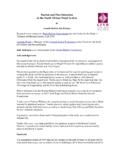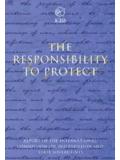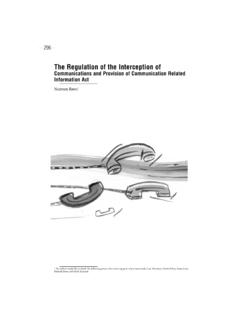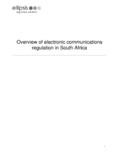Transcription of CONSTITUTIONAL COURT OF SOUTH AFRICA Case CCT 8/99 …
1 CONSTITUTIONAL COURT OF SOUTH AFRICA . Case CCT 8/99. ARNOLD KEITH AUGUST First Applicant VERONICA PEARL SIBONGILE MABUTHO Second Applicant versus THE ELECTORAL commission First Respondent THE CHAIRPERSON OF THE ELECTORAL commission Second Respondent THE MINISTER OF HOME AFFAIRS Third Respondent THE MINISTER OF CORRECTIONAL SERVICES Fourth Respondent Heard on : 19 March 1999. Decided on : 1 April 1999. JUDGMENT. SACHS J: The Context [1] The issue before this COURT concerns the voting rights of prisoners. It arises in an appeal against the judgment of Els J in the Transvaal High COURT which in effect SACHS J. held that the Electoral commission (the commission )1 had no obligation to ensure that awaiting trial and sentenced prisoners may register and vote in the general elections which has been announced for 2 June 1999. [2] In the first democratic elections held five years ago, Parliament determined that, with certain specified exceptions, all prisoners could vote. The interim Constitution2 provided for universal adult suffrage and did not expressly disqualify any prisoners.
2 It did, however, provide that disqualifications could be prescribed by The Electoral Act4 (the 1993 Electoral Act) disqualified persons on four grounds, two of which related to mental incapacity, the third to drug dependency and the fourth to imprisonment for specified serious offences. More specifically, section 16(d) of the 1993 Electoral Act declared that no person shall be entitled to vote in the election if that person was: (d) detained in a prison after being convicted and sentenced without the option of a fine in respect of .. (i) [m]urder, robbery with aggravating circumstances and rape;. 5. or (ii) any attempt to commit [such an] offence.. 1. The Electoral commission is established under chapter 9 of the 1996 Constitution. 2. Constitution of the Republic of SOUTH AFRICA , Act 200 of 1993. 3. Section 6(c); see also section 21(2). 4. Act 202 of 1993. 5. Section 16 of the Electoral Act 202 of 1993, reads as follows: Persons not entitled to vote. - Notwithstanding the provisions of section 15, no person shall be entitled to vote in the election if that person is- (a) subject to an order of COURT declaring him or her to be of unsound mind or mentally disordered or affected.
3 2. SACHS J. All other prisoners were therefore entitled to vote. This Act went on to state that the commission should make regulations providing for voting stations for and the procedure regulating the casting and counting of votes by prisoners and persons awaiting trial, other than those specifically [3] The 1996 Constitution provides that one of the values on which the one, sovereign and democratic state of the Republic of SOUTH AFRICA is founded is [u]niversal adult suffrage and a national common voters roll .7 It goes on to guarantee that [e]very adult citizen has the right .. to vote in elections for any legislative body established in terms of the Constitution, and to do so in secret; .. 8. Unlike the interim Constitution, however, the above sections contain no provision allowing for disqualifications from voting to be prescribed by law. Accordingly, if Parliament seeks to limit the unqualified right of adult suffrage entrenched in the Constitution, it will be obliged to do so in terms of a law of general application which (b) detained as a mentally ill patient under the Mental Health Act, 1973 (Act No.)
4 18 of 1973), or any other applicable law of the Republic, as the case may be;. (c) detained under the Prevention and Treatment of Drug Dependency Act, 1992 (Act No. 20 of 1992), or any other applicable law of the Republic, as the case may be; or (d) detained in a prison after being convicted and sentenced without the option of a fine in respect of any of the following offences irrespective of any other sentence in respect of any offence not mentioned hereunder which is served concurrently with the first-mentioned sentence: (i) Murder, robbery with aggravating circumstances and rape; or (ii) any attempt to commit any offence referred to in subparagraph (i).. 6. Section 76(1). 7. Section 1(d) of the 1996 Constitution. 8. Section 19(3)(a). 3. SACHS J. meets the requirements of reasonableness and justifiability as set out in section [4] As far as the coming general elections are concerned, Parliament has not sought to limit the right of prisoners to vote. The Electoral Act10 (the 1998 Electoral Act) provides that: 6(1) Any SOUTH African citizen in possession of an identity document may apply for registration as a voter.
5 7(1) A person applying for registration as a voter must do so - (a) in the prescribed manner; and (b) only for the voting district in which that person is ordinarily resident. 8(1) If satisfied that a person's application for registration complies with this Act, the chief electoral officer must register that person as a voter by making the requisite entries in the voters' roll.. The disqualifications are given as follows: 8(2) The chief electoral officer may not register a person as a voter if that person - (a) has applied for registration fraudulently or otherwise than in the prescribed manner;. (b) is not a SOUTH African citizen;. (c) has been declared by the High COURT to be of unsound mind or mentally disordered;. (d) is detained under the Mental Health Act, 1973 (Act No. 18 of 1973);. or (e) is not ordinarily resident in the voting district for which that person has applied for registration.. 9. Section 36(1) provides: The rights in the Bill of Rights may be limited only in terms of law of general application to the extent that the limitation is reasonable and justifiable in an open and democratic society based on human dignity, equality and freedom.
6 10. Act 73 of 1998. 4. SACHS J. Prisoners are not included in the list of disqualified persons. [5] The Act goes on to deal with applications for special votes by persons who find it impossible to appear in person at the voting stations. Section 33 provides for special votes in the following terms: (1) The commission - (a) must allow a person to apply for a special vote if that person cannot vote at a voting station in the voting district in which the person is registered as a voter, due to that person's- (i) physical infirmity or disability, or pregnancy;. (ii) absence from the Republic on Government service or membership of the household of the person so being absent; or (iii) absence from that voting district while serving as an officer in the election concerned, or while on duty as a member of the security services in connection with the election;. (b) may prescribe other categories of persons who may apply for special votes.. Once more, no express mention is made of prisoners.
7 The Issues [6] It was in this setting of legislative silence, where Parliament has done nothing to limit the CONSTITUTIONAL entitlement of prisoners to vote, that the applicants approached the commission to ensure that as prisoners they would indeed be enabled to register and vote. First applicant is a convicted prisoner serving a long sentence for fraud, while the second applicant is an unsentenced prisoner in custody awaiting her 5. SACHS J. trial later this year on charges of fraud. Acting in their own interest and on behalf of all prisoners, the applicants sought an undertaking from the commission that prisoners would be able to take part in the elections. [7] It is not necessary to canvass the extensive correspondence conducted with the respondents on their behalf by the Legal Resources Centre (the LRC) save to say that the applicants asserted their claims even before the 1998 Electoral Act was promulgated on 16 October When no satisfactory response was received from the commission , the applicants launched an application on 23 December 1998 for a declaration and orders enabling them and other prisoners to register and vote.
8 On 21. January 1999, the commission wrote to the LRC in the following terms: We confirm that the commission will not oppose the application, save to make representations to persuade the COURT to pronounce itself on the issues raised in our letter and further that the commission will abide the decision of the said COURT . In that regard, the commission undertakes to do everything within its capacity to enable prisoners to register and to vote should the COURT 's decision be to that effect.. The commission therefore made it plain that it undertook, within its capacity, to enable prisoners to register and vote should a COURT so order. [8] The matter came before Els J in the Transvaal High COURT on 22 February 1999. and judgment was delivered the next day. Relying heavily on the affidavit filed by the second respondent, the learned judge stated that in his view there had been neither a 11. As early as 22 September 1998, the LRC had sent a letter to the chief electoral officer asking the commission whether prisoners would be allowed to participate in the 1999 elections and to supply reasons for any such decision.
9 The commission responded in a letter, dated 5 October 1998, which described the constitutionally prescribed functions and mandate of the commission , its duties and functions under the Electoral commission Act, 51 of 1996, but failed to address the issue of what (if any) arrangements were being made to allow prisoners to apply for registration and to vote. It was not until 8 December 1998, that the chief electoral officer responded to the LRC's request by unequivocally stating in the letter that the commission had 6. SACHS J. commission nor an omission on the part of first and second respondents which resulted in undue limitation to the CONSTITUTIONAL right of prisoners to vote. He went on to hold that [a]ll prisoners have the right to register as voters and to vote as any other SOUTH African citizen who is over 18 and in [possession] of an identification document. If a person does something which deprives him or her of the opportunity to register as a voter or to vote, the first and second respondents cannot be held responsible.
10 An example is a person who specifically decides not to register because he does not want to vote, also a person who is on vacation and decides not to return to his ordinary place of residence for the purpose of voting. The predicament in which the first and second applicants and all other prisoners, sentenced or unsentenced, find themselves, is of their own making. They have deprived themselves of the opportunity to register and or to vote. (Emphasis in the original). Bearing in mind what he regarded as insurmountable logistical, financial and administrative difficulties, and on the basis that special measures to accommodate voters should be reserved for those voters whose predicament was not of their own making , Els J dismissed the application, making no order as to costs. [9] Wishing to appeal to this COURT the applicants then applied for a certificate in terms of rule 18 of the Rules of this COURT . The learned judge, in effect, issued a negative certificate on the grounds that although the matter was of public interest and the evidence was sufficient for a decision to be made, nevertheless there were no reasonable prospects that this COURT would arrive at a conclusion different from his.















